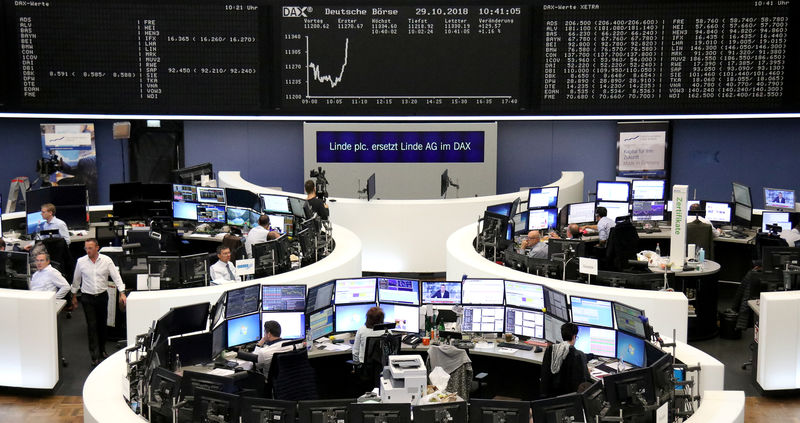 © Reuters. The German share price index DAX graph at the stock exchange in Frankfurt
© Reuters. The German share price index DAX graph at the stock exchange in FrankfurtBy Sujata Rao and Marc Jones
LONDON (Reuters) – European fund managers have used this month’s decline in global stock markets to bump up their equity exposure to the highest since January, though bond holdings have waned and Italy remains a serious concern.
The Reuters monthly asset allocation poll of 16 European asset managers was conducted between Oct. 16-30, when world stocks () were seeing their worst rout since the mid-2012 peak of the euro zone crisis.
The regions in vogue this month include Latin America, where conservative Jair Bolsonaro has been elected in Brazil and Argentina has landed a new International Monetary Fund support deal. Europeans funds have bought in the euro zone, too.
In contrast, U.S., UK and emerging-market Asian stocks were all trimmed as investors eyed a variety of risks, not least the U.S.-China trade war, stuttering Brexit negotiations, stretched prices and rising global interest rates.
U.S. equity holdings fell over 2 percentage points to 42.1 percent which marks a four-month low. UK equity exposure dropped to the lowest since March 2017 at 5.1 percent.
Continental European poll participants who answered a question on whether the Britain’s pound would be stronger or weaker after next March’s Brexit deadline were evenly split in their views.
Italy concerns are clearly raw as its populist coalition government confronts the European Commission over its budget spending plans.
Seven of the nine fund managers who answered thought the closely watched premium between triple A-rated German government bonds and Italy government debt, the yield spread, could still get wider.
“We don’t see a stable situation yet,” said Amundi Group Chief Investment Officer Pascal Blanqué. “More steps are probably needed in order to reach a compromise with the EU commission. Volatility is here to stay in Italian spreads.”
Overall levels of euro zone bond holdings have also been pruned this month to just about 50 percent. But with signs that U.S. interest rates will keep nudging up, U.S. and Canadian holdings have fallen the most, at close to 2 percentage points, to 28.5 percent.
“The recent market correction seems excessive, for equities in particular,” said Julien Servit at Prime Partners.
“The sentiment has dramatically changed in a matter of two months without concrete facts justifying it. The correction could offer an opportunity,” he added.
Fusion Media or anyone involved with Fusion Media will not accept any liability for loss or damage as a result of reliance on the information including data, quotes, charts and buy/sell signals contained within this website. Please be fully informed regarding the risks and costs associated with trading the financial markets, it is one of the riskiest investment forms possible.
Source: Investing.com




























